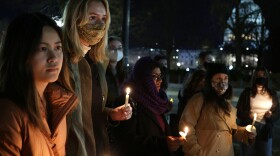
Sarah McCammon
Sarah McCammon is a National Correspondent covering the Mid-Atlantic and Southeast for NPR. Her work focuses on political, social and cultural divides in America, including abortion and reproductive rights, and the intersections of politics and religion. She's also a frequent guest host for NPR news magazines, podcasts and special coverage.
During the 2016 election cycle, she was NPR's lead political reporter assigned to the Donald Trump campaign. In that capacity, she was a regular on the NPR Politics Podcast and reported on the GOP primary, the rise of the Trump movement, divisions within the Republican Party over the future of the GOP and the role of religion in those debates.
Prior to joining NPR in 2015, McCammon reported for NPR Member stations in Georgia, Iowa and Nebraska, where she often hosted news magazines and talk shows. She's covered debates over oil pipelines in the Southeast and Midwest, agriculture in Nebraska, the rollout of the Affordable Care Act in Iowa and coastal environmental issues in Georgia.
McCammon began her journalism career as a newspaper reporter. She traces her interest in news back to childhood, when she would watch Sunday-morning political shows – recorded on the VCR during church – with her father on Sunday afternoons. In 1998, she spent a semester serving as a U.S. Senate Page.
She's been honored with numerous regional and national journalism awards, including the Atlanta Press Club's "Excellence in Broadcast Radio Reporting" award in 2015. She was part of a team of NPR journalists that received a first-place National Press Club award in 2019 for their coverage of the Pittsburgh synagogue attack.
McCammon is a native of Kansas City, Mo. She spent a semester studying at Oxford University in the U.K. while completing her undergraduate degree at Trinity College near Chicago.
-
One year after a restrictive abortion law took effect, a poll shows a majority of Texans surveyed say they support abortion access in most or all cases. Many say the issue will motivate them to vote.
-
The U.S. Supreme Court has overturned the constitutional right to an abortion, reversing Roe v. Wade, the court's five-decade-old decision that guaranteed a woman's right to obtain an abortion.
-
New data from the Guttmacher Institute shows the number of abortions rose in 2020, reversing a decades-long trend toward declining numbers.
-
Barring legal challenges, Idaho's law is scheduled to take effect in about a month. It bans most abortions after about six weeks and allows health care providers to be sued.
-
It's been six months since the Texas law banning almost all abortions after about six weeks of pregnancy took effect. Doctors and patients feel frustrated as they navigate the new legal environment.
-
The agency's decision to ease access to the drug mifepristone comes at a time when abortion rights are being increasingly restricted nationwide.
-
The law bans nearly all abortions, and doctors providing pregnancy care are hoping for more clarity soon, as legal challenges continue.
-
The Trump administration tried to "defund" Planned Parenthood and other groups through changes to the Title X family planning program. The Biden administration is proposing reversing those rules.
-
Texas Sen. Ted Cruz — a Princess Bride super fan — expressed disapproval as the cast of the 1980s cult classic plans to reunite for a fundraiser on behalf of the Democratic Party of Wisconsin.
-
Planned Parenthood facilities are reporting a more than sevenfold increase in patients from Texas. The ban was put in place because of the coronavirus but having to travel can increase patients' risk.










